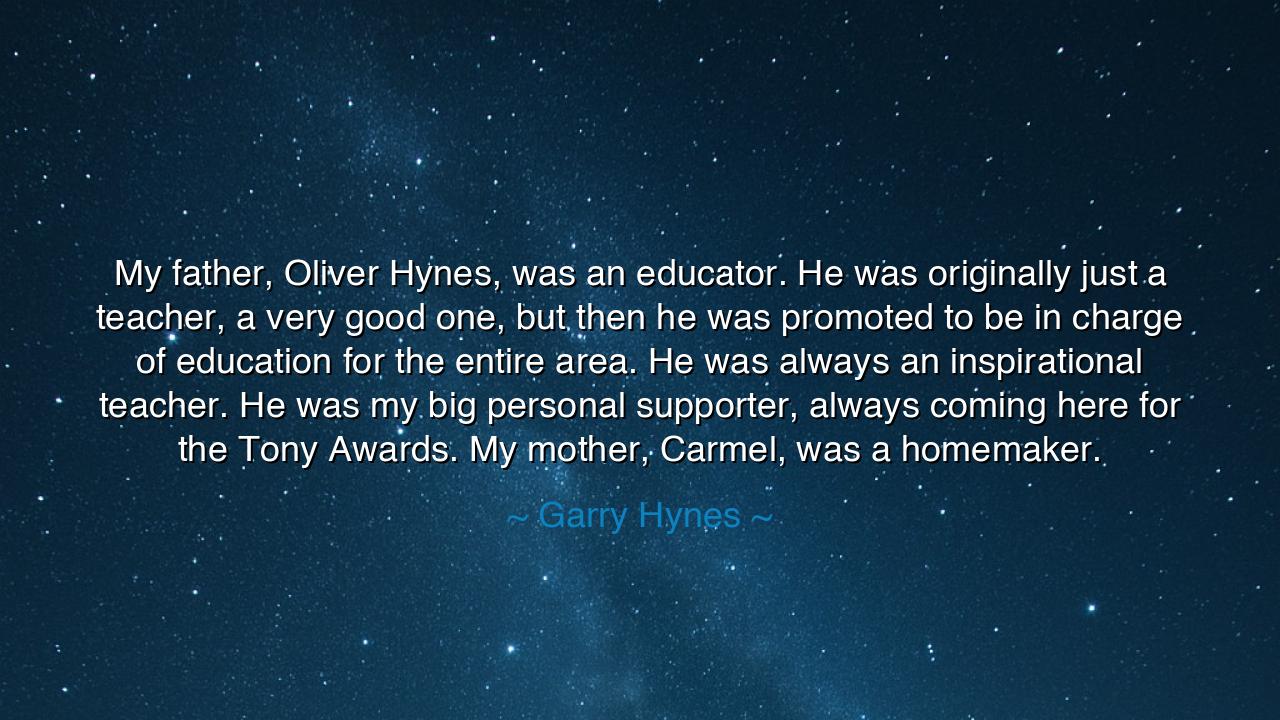
My father, Oliver Hynes, was an educator. He was originally just
My father, Oliver Hynes, was an educator. He was originally just a teacher, a very good one, but then he was promoted to be in charge of education for the entire area. He was always an inspirational teacher. He was my big personal supporter, always coming here for the Tony Awards. My mother, Carmel, was a homemaker.






In the tender and reverent words of Garry Hynes, we hear the voice of gratitude echoing across generations: “My father, Oliver Hynes, was an educator. He was originally just a teacher, a very good one, but then he was promoted to be in charge of education for the entire area. He was always an inspirational teacher. He was my big personal supporter, always coming here for the Tony Awards. My mother, Carmel, was a homemaker.” These are not merely words of remembrance—they are a song of inheritance, a testament to the enduring power of parental guidance, love, and humility. Within this reflection lies an ancient truth: that those who teach and nurture shape destinies far beyond their own.
The origin of this quote lies in the life of Garry Hynes, the first woman ever to win a Tony Award for directing—a figure who has left her mark on the world of theatre through vision, courage, and mastery. Yet in this quote, she turns not to her own achievements, but to the roots that nourished them. She speaks of her father, an educator, and her mother, a homemaker, recognizing that before the applause of the world came the quiet encouragement of home. Her father’s devotion to learning and mentorship, and her mother’s devotion to care and stability, formed the invisible architecture of her success. This is a lesson as old as civilization itself: behind every great builder of worlds stands someone who first taught them how to see.
In praising her father, Hynes honors a sacred calling—the calling of the teacher. For the teacher is not simply a transmitter of knowledge but a cultivator of souls. The ancients knew this well. In Greece, Socrates taught that education is the kindling of a flame, not the filling of a vessel. The flame lit by Oliver Hynes burned first in his classroom, then in his daughter’s heart. His promotion, from teacher to leader of education in his region, mirrors the timeless ascent of those who serve not for power, but for purpose. His influence extended beyond titles; it was carried in the living spirits of those he inspired, Garry among them. His was a greatness that sought no stage, yet prepared his daughter to stand upon one.
And when Hynes speaks of her mother, Carmel, the homemaker, she completes the balance that sustains all creation—the dual force of intellect and nurture, wisdom and warmth. For if the father taught her to think, the mother taught her to feel. The home, built by her mother’s patience and care, became the sanctuary where Garry’s imagination could grow. The ancients would have called Carmel’s labor invisible virtue—the work that asks for no reward but forms the foundation of all beauty and strength. Together, Oliver and Carmel represent two halves of a divine whole: education and empathy, discipline and devotion, the mind that teaches and the heart that sustains.
Such stories remind us that inspiration need not always come from the grand or the famous. It is often born quietly, in living rooms and classrooms, through words of encouragement spoken at just the right time. When Garry recalls her father attending the Tony Awards, we glimpse the image of a teacher who never stopped being a student of life—one who rejoiced not in his own triumphs, but in his child’s fulfillment. This, too, is the mark of a true teacher: to delight in the success of others, and to see one’s influence flower in the next generation.
Consider, then, how many great souls have owed their light to such humble origins. The philosopher Marcus Aurelius wrote of his gratitude to his teachers, especially those who taught him “modesty, humanity, and steadfastness.” The painter Leonardo da Vinci learned his early craft under the quiet patience of Verrocchio. And Garry Hynes, the director who reshaped modern theatre, first learned inspiration from the lessons and love of her parents. The lineage of greatness always begins in the unseen.
Let this be the lesson for every listener: cherish the teachers and nurturers in your life, for they are the unseen architects of your destiny. Honor them not only in memory but in practice—by carrying forward their values in your own work. If you are a parent, teach not just with words but with example. If you are a student, remember that gratitude is the highest form of learning. And if you are both, as we all are, remember that wisdom is not inherited; it is passed through love, generation to generation.
Thus spoke Garry Hynes, not to glorify herself, but to illuminate a truth that transcends her own story: that the mightiest achievements are built upon foundations laid by teachers and homemakers, by those who give of themselves quietly and completely. Their legacy endures not in monuments or titles, but in the lives they shape. And so, let us honor them—not only in words, but in the way we live, learn, and lift others. For as Garry Hynes’s life teaches us, every triumph is a family of spirits working as one—the mind that teaches, the heart that nurtures, and the soul that dares to dream.






AAdministratorAdministrator
Welcome, honored guests. Please leave a comment, we will respond soon